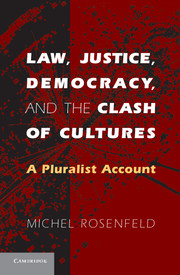Book contents
- Frontmatter
- Contents
- Introduction
- Part I Liberal Justice and Fleeting Specters of Unity
- 1 Reframing Comprehensive Pluralism
- 2 Equality and the Dialectic Between Identity and Difference
- 3 Human Rights and the Clash Between Universalism and Relativism
- Part II E Pluribus Unum?
- Part III Can Pluralism Thrive in Times of Stress?
- Bibliography
- Index
2 - Equality and the Dialectic Between Identity and Difference
from Part I - Liberal Justice and Fleeting Specters of Unity
Published online by Cambridge University Press: 05 June 2012
- Frontmatter
- Contents
- Introduction
- Part I Liberal Justice and Fleeting Specters of Unity
- 1 Reframing Comprehensive Pluralism
- 2 Equality and the Dialectic Between Identity and Difference
- 3 Human Rights and the Clash Between Universalism and Relativism
- Part II E Pluribus Unum?
- Part III Can Pluralism Thrive in Times of Stress?
- Bibliography
- Index
Summary
Equality is of paramount concern for both liberalism and pluralism; it plays a central role in mapping out the relationship between the self and the other as made manifest in Hegel’s account of the struggle between the lord and the bondsman discussed in Chapter 1, and it figures prominently in all modern and post-modern conceptions of justice. Equality must properly account for identity and difference – or, more precisely, identities and differences – between self and other. As underscored by the key role of the abstract ego in theories such as those of Kant and Rawls, liberal individualism is well poised to focus on identity, but, as will be discussed in this chapter, it has had persistent trouble coping with difference. This difficulty becomes more acute in the face of equality claims arising in the context of identity politics.
In what follows, I will compare the liberal and pluralist approaches to equality and argue that the latter is better suited for purposes of approximating justice between self and other. In this chapter, I tackle equality in general. In Chapter 3, I will address the question of minority group rights in terms of the dialectic between identity and difference as it plays out in relation to the determination of what is encompassed by human rights.
- Type
- Chapter
- Information
- Law, Justice, Democracy, and the Clash of CulturesA Pluralist Account, pp. 68 - 91Publisher: Cambridge University PressPrint publication year: 2011
- 1
- Cited by



